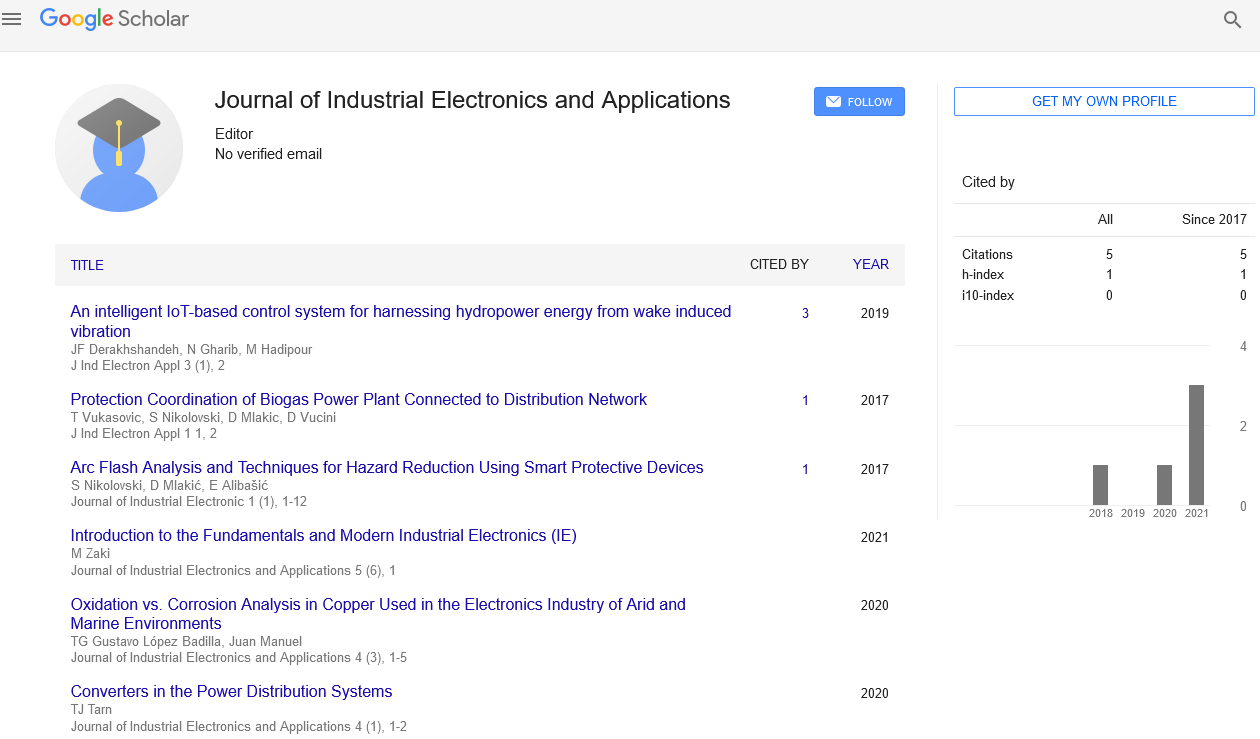Perspective, J Ind Electron Appl Vol: 7 Issue: 1
Unleashing the Power of Industrial Cyber-Physical Systems: Bridging the Gap between Automation and Connectivity
Jun Eli Anlie*
1Key Laboratory of Aerospace Information Security and Trusted Computing, School of Cyber Science and Engineering, Wuhan University, Wuhan 430072, China
*Corresponding Author: Jun Eli Anlie
Key Laboratory of Aerospace Information
Security and Trusted Computing, School of Cyber Science and Engineering,
Wuhan University, Wuhan 430072, China;
E-mail: jeli@eli.edu.cn
Received date: 24 February, 2023, Manuscript No. JIEA-23-95935;
Editor assigned date: 28 February, 2023, PreQC No. JIEA-23-95935(PQ);
Reviewed date: 13 March, 2023, QCNo JIEA-23-95935;
Revised date: 21 March, 2023, Manuscript No. JIEA-23-95935(R);
Published date: 30 March, 2023, DOI: 10.4172/JIEA.1000023.
Citation: Anlie JE (2023) Unleashing the Power of Industrial Cyber-Physical Systems: Bridging the Gap between Automation and Connectivity. J Ind Electron Appl 7:1.
Description
Industrial Cyber-Physical Systems (ICPS) are revolutionizing the way industries operate, enabling greater connectivity, automation, and data-driven decision making. ICPS refer to the integration of physical systems, such as machines, sensors, and devices, with digital systems, such as software, data analytics, and communication networks, to create intelligent and interconnected systems that can autonomously monitor, analyze, and optimize industrial processes. In this study, we will explore the transformative impact of ICPS on industries and discuss their key features, challenges, and future prospects.
Key features of ICPS
ICPS have several key features that make them unique and powerful in transforming industries.
Firstly, ICPS enable real-time monitoring and control of industrial processes, allowing for proactive detection and resolution of issues, optimizing performance, and minimizing downtime. This can lead to improved operational efficiency, cost savings, and enhanced product quality.
Secondly, ICPS facilitate seamless communication and coordination between various components of the industrial ecosystem, including machines, sensors, devices, humans, and other digital systems. This can enable better collaboration, synchronization, and decision making, leading to improved productivity and agility.
Thirdly, ICPS enable data-driven decision making by collecting, analyzing, and interpreting vast amounts of data from various sources, such as sensors, machines, and external systems. This can provide valuable insights, predictive analytics, and optimization recommendations, enabling intelligent decision making and innovation.
Challenges of ICPS
While ICPS offer tremendous potential, they also face several challenges that need to be addressed for their widespread adoption.
Firstly, security and privacy are essential concerns in ICPS, as the integration of physical and digital systems creates vulnerabilities that can be exploited by malicious actors. Robust security measures, such as encryption, authentication, and access controls, need to be implemented to protect ICPS from cyber threats.
Secondly, interoperability is a challenge in ICPS, as different components of the industrial ecosystem may use different communication protocols, data formats, and interfaces. Standardization efforts, such as the Industrial Internet of Things (IIoT) standards, are needed to ensure seamless integration and interoperability of ICPS.
Thirdly, human factors play an important role in ICPS, workers need to adapt to the changing roles and responsibilities in the digitalized industrial environment. Training, upskilling, and change management efforts are necessary to enable a smooth transition to ICPS and ensure the workforce's readiness.
Future prospects of ICPS
Despite the challenges, ICPS offer promising future prospects for industries. Firstly, ICPS can enable the concept of the "smart factory," where the entire production process is autonomously managed, optimized, and continuously improved. This can result in highly efficient, flexible, and sustainable production systems that are capable of responding to changing market demands in real-time.
Secondly, ICPS can facilitate the development of new business models, such as product-as-a-service and pay-per-use, where industrial products and services are offered as digitalized and connected solutions. This can lead to increased customer value, revenue streams, and business growth.
Thirdly, ICPS can contribute to sustainability and environmental conservation efforts by optimizing resource utilization, reducing waste, and optimizing energy consumption. This can result in greener and more sustainable industrial operations, contributing to a more sustainable future.
Industrial cyber-physical systems are transforming industries by enabling greater connectivity, automation, and data-driven decision making. They offer several key features, including real-time monitoring and control, seamless communication and coordination, and data-driven decision making. However, they also face challenges related to security, interoperability, and human factors that need to be addressed for their successful adoption. Despite these challenges, ICPS offer promising future prospects for industries, including the development of smart factories.
 Spanish
Spanish  Chinese
Chinese  Russian
Russian  German
German  French
French  Japanese
Japanese  Portuguese
Portuguese  Hindi
Hindi 